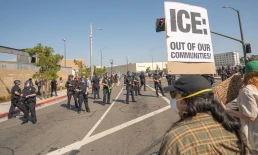How powerful can this movement-based opposition be? That depends on what the ordinary Americans being harmed by the Trump regime decide to do.
By Jeremy Brecher
You don’t have to be radical leftist to be concerned about the way Donald Trump and his MAGAs are threatening the well-being of ordinary Americans—and government of the people, by the people, and for the people.
In a recent Washington Post poll, those polled disapprove of how Trump is handling the economy by 59 to 40%. Some 70% said tariffs are increasing the prices they pay for basic necessities.

A Reuters/Ipsos poll found that, in the face of President Trump’s threat to send troops into American cities, 58% of Americans said the president should only send armed troops to face external threats.
Some 62% of Americans say the federal government has too much power, up from 51% a year ago.
The problem is, few people see the Democratic Party as an effective opposition that is fighting for their interests. A recent Economist/YouGov poll found that only 33% of adults had a favorable opinion of the Democratic Party while 60% had an unfavorable opinion.
Fortunately, there is an effective opposition developing in America. It is being created by grassroots social movements and by ordinary people who have decided they have to take responsibility for their own future. This “movement-based opposition” doesn’t run campaigns for politicians, but it is having a powerful if little-recognized impact on American politics.
Civil society resistance has emerged rapidly during the first year of Trump’s presidency. It is represented by the mass nonviolent protest to Immigration and Customs Enforcement (ICE) in Los Angeles and elsewhere and the five million participants in No Kings Day and other national days of action. It is developing significant power as more and more people see and experience the harm the Trump administration and the MAGA Congress are inflicting on individuals, groups, and society as a whole. This movement-based opposition is no longer a marginal force but is now MAGA’s most powerful opponent.
How powerful can this movement-based opposition be? That depends on what the ordinary Americans being harmed by the Trump regime decide to do. We can stand on the sidelines and watch, or we can join the millions of Americans who are actively protecting ourselves and our society against that attack.
How can we protect ourselves and others who are under attack:
We can organize in our own communities and constituencies to fight for our needs. Parents can organize through their PTAs; the elderly can organize through their senior centers; veterans can organize through their networks of fellow veterans; workers can organize through their unions; all of us can organize through our community organizations and local governments.
We can participate in actions like No Kings Day that bring together all of us who refuse to be turned to impoverished peons by the Trump offensive.
It’s easy to feel that such actions are futile, but there is plenty of evidence to the contrary, including (and there are many more examples):
- Boycotts and mass “Tesla Takedown” demonstrations at Tesla dealerships in the US and around the world crashed Tesla sales and led to Elon Musk’s withdrawal from Washington and split with President Trump.
- When medical professionals organized to oppose firing CDC workers many of those terminations were reversed. Public pressure may not be credited with many of Trump policy reversals, but it’s clear that they suddenly say, um, that was just an administrative error or, in this case, those CDC employees received “incorrect notifications.”
- Pressure from below forced wavering Democrats in Congress to stand up to the Republic budget bill to ensure the healthcare ordinary Americans depend on.
The emerging movement-based opposition aims to halt and undo the harm that has been done by Trump and MAGA, but it does not aim to return to the world as it existed before Trump. That is clearly not what most people want, and it offers little hope of solving our real problems. Rather, this nonviolent uprising can be the starting point for creating the world we want beyond MAGA. As Abraham Lincoln said of the Civil War, it can become the means for a new birth of freedom.
Jeremy Brecher is the author of more than 15 books on labor and social movements, including the labor history classic Strike! and The Green New Deal from Below: How Ordinary People Are Building a Just and Climate-Safe Economy. He is co-founder of the Labor Network for Sustainability.
Recent Posts
U.S. Media Keen on Iranian Unrest—Less So on U.S. and Israel’s Role in It
January 30, 2026
Take Action Now Democrats have a rare moment of leverage to pass legislation ending qualified immunity for Immigration and Customs Enforcement…
The Senate Must Not Fund ICE, A Zero Hour Conversation With Sonali Kolhatkar
January 30, 2026
Take Action Now “We’ve seen a really sharp change in how the public views immigration enforcement, particularly ice, to the point where…
How Democrats Can End Qualified Immunity for ICE Agents
January 28, 2026
Take Action Now Democrats have a rare moment of leverage to pass legislation ending qualified immunity for Immigration and Customs Enforcement…
Save New START- Nuclear Arms Treaties Must Not Expire
January 27, 2026
Take Action Now Letting New START expire would end more than a treaty — it would end the last remaining restraint on nuclear escalation.By Leah…




